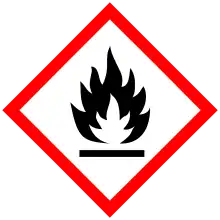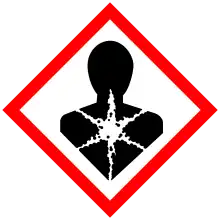 | |
| Names | |
|---|---|
| Preferred IUPAC name
Cyclohepta-1,4-diene | |
| Other names
1,4-Cycloheptadiene | |
| Identifiers | |
3D model (JSmol) |
|
| Abbreviations | 1,4-CHDN |
| ChemSpider | |
| MeSH | 1,4-cycloheptadiene |
PubChem CID |
|
| UNII | |
| UN number | 3295 |
CompTox Dashboard (EPA) |
|
| |
| |
| Properties | |
| C7H10 | |
| Molar mass | 94.157 g·mol−1 |
| Appearance | Colorless liquid |
| Density | 0.84 g cm−3 |
| Boiling point | −150.445 °C; −238.801 °F; 122.705 K |
Refractive index (nD) |
1.48 |
| Hazards | |
| GHS labelling: | |
  | |
| Danger | |
| H225, H340, H350, H373 | |
| P201, P210, P308+P313 | |
| NFPA 704 (fire diamond) | |
| Flash point | 6.293 °C (43.327 °F; 279.443 K) |
Except where otherwise noted, data are given for materials in their standard state (at 25 °C [77 °F], 100 kPa).
Infobox references | |
1,4-Cycloheptadiene is a highly flammable cycloalkene that occurs as a colorless clear liquid. It can form a yellow complex with palladium.[1]
References
- ↑ Rettig, Michael F.; Wing, Richard M. (June 1981). "X-ray crystallographic, chemical, and spectroscopic studies of the palladium dichloride complexes of cyclonona-1,5-diene, cycloocta-1,5-diene, cycloocta-1,4-diene, and cyclohepta-1,4-diene". Journal of the American Chemical Society. 103 (11): 2980–2986. doi:10.1021/ja00401a012.
This article is issued from Wikipedia. The text is licensed under Creative Commons - Attribution - Sharealike. Additional terms may apply for the media files.
